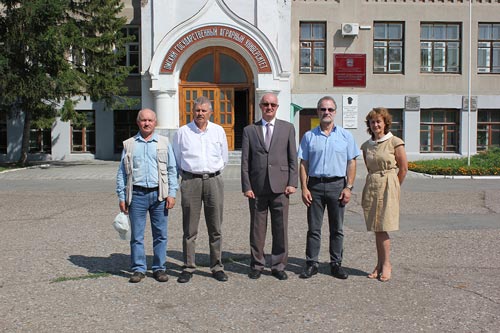
CIMMYT Global Wheat Program director Hans-Joachim Braun and winter wheat breeder Alex Morgounov attended the G-20 Meeting of Agricultural Chief Scientists in Moscow, Russia, on 24-25 July 2013 where they presented on CRP WHEAT and the cooperation between CIMMYT and Russia. The G-20 meeting adopted a declaration stating the importance of cooperation in agricultural research and defining future priority areas and directions for this cooperation. The meeting also emphasized the involvement of the Russian Federation in international agricultural research and development. In 2013, Russia supported CRP WHEAT with US$1.1 million, part of which was allocated to the Kazakhstan-Siberian Network on Wheat Improvement (KASIB) for spring wheat improvement and part to Strategic Initiatives related to biotic and abiotic stresses. The funds utilization and strengthening of cooperation with Russian scientists were discussed with Sergey Kiselev, director of Eurasian Center of Food Security at Lomonosov Moscow State University, and Ivan Savchenko, vice president of the Russian Academy of Agricultural Sciences.
Following the meeting, Braun and Morgounov visited Omsk in Western Siberia on 26 July to sign a sub-grant agreement between CIMMYT and Omsk State Agrarian University on technical coordination of KASIB activities; development of shuttle breeding germplasm for Russian cooperating institutions; and expansion of training and visits between the university and CIMMYT, and attendance of regional and international conferences for Russian scientists.
The subsequent field visits to the university and Siberian Agricultural Research Institute demonstrated the value of regional germplasm exchange and improved adaptation of the shuttle germplasm developed for the region in Mexico and Turkey. “The shuttle breeding program, initiated in early 2000s to incorporate rusts resistance into local material, finally bears fruit as several advanced lines competitive with local checks have been identified and will be considered as variety candidates in the near future,” said Morgounov. As Northern Kazakhstan and Western Siberia jointly cultivate almost 20 million hectares of high latitude spring-planted wheat, this area plays a significant role in global wheat supply.
 Climate adaptation and mitigation
Climate adaptation and mitigation 
